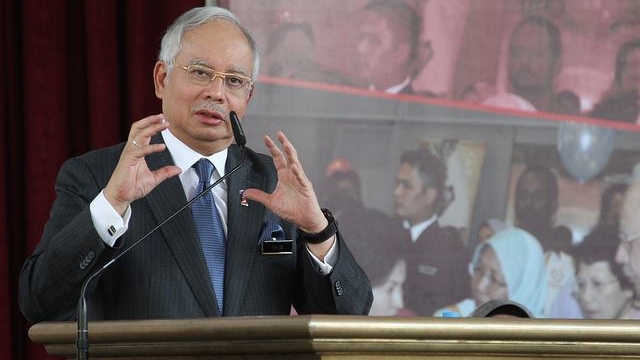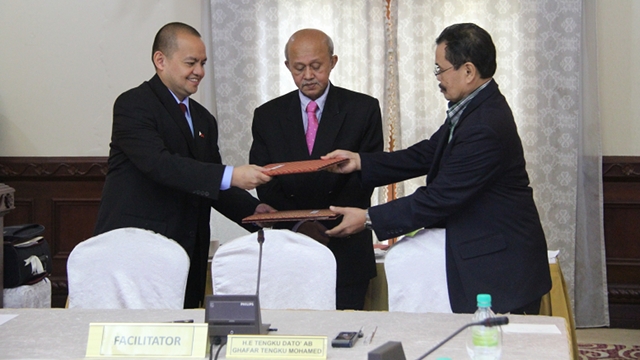SUMMARY
This is AI generated summarization, which may have errors. For context, always refer to the full article.

MANILA, Philippines (UPDATED) – His country has hosted peace talks between the Philippine government and the Moro Islamic Liberation Front (MILF) for over a decade, and on Sunday, October 14, it is the Philippines’ turn to host him.
Malaysian Prime Minister Dato’ Sri Mohammad Najib bin Tun Abdul Razak arrived in the Philippines on the eve of the historic signing of the Framework Agreement between the Philippine government and the MILF.
“Just landed in Manila to make a historic visit. We have worked hard to bring about peace in Southern Philippines,” Najib said Sunday afternoon through his Twitter account (@NajibRazak).
Najib will hold a bilateral meeting with President Benigno Aquino III at 10 am on Monday, October 15, before the signing of the peace deal at 1:30 pm. The Malaysian Prime Minister will witness the signing, along with the secretary general of the Organization of Islamic Cooperation and MILF Chair Al Haj Murad Ebrahim, who will step foot in Malacañang for the first time.
“We want everybody who has helped in the agreement to witness the event,” Deputy Presidential Spokesperson Abigail Valte told Rappler on Saturday, October 13. It will be Najib’s first official visit to the Philippines.
Aquino himself recognized Malaysia’s crucial role when he announced the Framework Agreement last Sunday, October 7.
“We would like to thank the government of Malaysia, who stood as facilitators as we realized our aspirations for peace; we thank in particular Prime Minister Dato’ Sri Mohammad Najib bin Tun Abdul Razak, whose commitment remained firm despite considerable political and personal risk,” Aquino said.
Long-time host
Malaysia has helped the Philippines craft a peace deal for 12 years.

Malaysia’s role marked the negotiations’ “Diplomatic Stage” after the first “Domestic Stage” from 1997 to 2001, which both parties held without a foreign third party.
In a Newsbreak piece in 2006, peace advocate Soliman Santos Jr said the MILF wanted mediation by an OIC country and a neutral international venue, among others, for resuming negotiations. This was after former President Joseph Estrada declared an “all-out war” against the MILF. The Philippine government and the MILF, thus, agreed on Malaysia.
“Malaysia’s facilitation, aside from hosting the talks, has usually involved the following functions: providing a conducive atmosphere and facilities, conveying the positions of the parties, playing ‘referee’ and bridging differences between the parties, witnessing commitments and understandings, and recording details of agreements by the parties,” Santos said.
He said Malaysia also wants to promote its preferred approach of economic development, merging Islam and modernity as it has done.
“Malaysia seems to be impressing a certain thesis on the MILF: if a group of people is economically well off, then other things will follow,” Santos explained. “For Malaysia, the bottom line is economics. Malaysia has a global perspective and wants to show that Southeast Asian countries can be as economically developed as others.”
In the early days of the Aquino administration, however, the government wanted to do away with a third-party facilitator. The MILF, on the other hand, sought to retain it. Eventually, the government agreed Malaysia should facilitate, provided that the chief Malaysian facilitator would be replaced for sketchy reasons – that he was “biased” or that they needed a diplomat, according to a Newsbreak piece in 2011.
‘Exposure tour’
Santos added that with Malaysia as venue, peace negotiators get an “exposure tour”
“There are lessons from the Malaysian experience relevant to a solution of the Bangsamoro problem: federalism, Islamic institutions, multiculturalism, the bumiputra (indigenous Malays) policy of affirmative action, and the sultanate as an institution,” he said.
On Monday, Malaysia’s Najib will witness the fruit of the past 12 years – when the Philippine government and the MILF “agree to agree,” so to speak, toward a final political settlement in 2016.
Crucial debates will now have to happen not only on the negotiating table, but in the open, the Philippine government’s chief negotiator Marvic Leonen told Rappler. (Watch more in the video below.)
“That’s precisely why this agreement is also going to succeed,” Leonen said. “It is because there will be a national debate, and there’s going to be a national discussion. And we are hoping that everybody will weigh in with their opinions. And weighing in with their opinions, the underlying fears can be examined, and the underlying questions can also be exposed.” – Rappler.com
For related stories, read:
- Govt, MILF reach deal
- 2012 Framework Agreement on the Bangsamoro political region
- FAQs: Bangsamoro peace deal
- Understanding the GPH-MILF Framework Agreement
- The Aquinos and the MILF
- #TalkThursday with Marvic Leonen: Give peace a chance
Add a comment
How does this make you feel?
There are no comments yet. Add your comment to start the conversation.